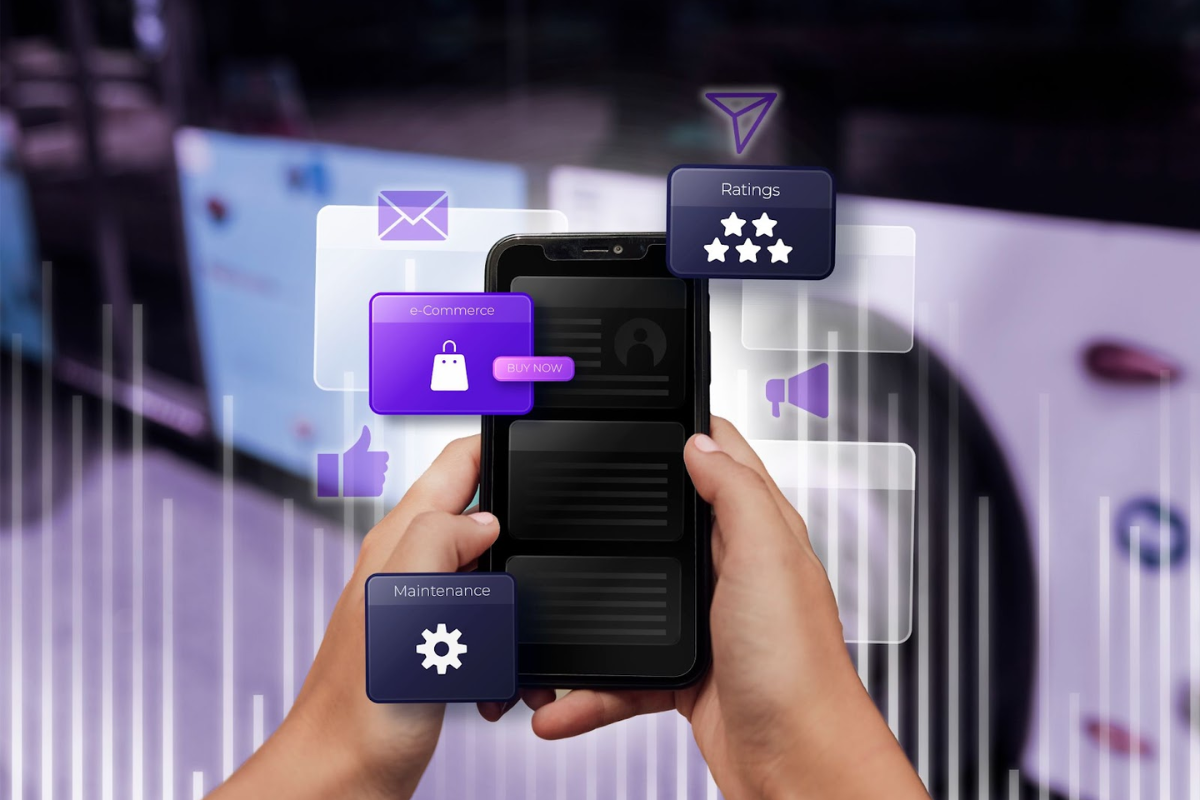What comes to your mind first when you hear about AI? The rise of machines, or a powerful tool for business, which 84% of companies have already implemented or consider a top priority?
Today we will look at the second point, discovering Artificial Intelligence and machine learning as game-changers for mobile applications and ecommerce software development solutions.
By 2027, AI’s global market value will likely reach $267 billion. To get all these technologies’ benefits as soon as possible, you need to understand the details today. In this review, you will learn about the following:
- what are AI and machine learning
- their benefits and challenges for m-commerce
- future of these technologies
Table of Contents
ToggleDefinition Of AI And Machine Learning. How Do AI And Machine Learning Work?
AI and machine learning are two parts of computer science but are not identical. To quote the definitions:
- artificial intelligence (AI), the ability of a digital computer or computer-controlled robot to perform tasks commonly associated with intelligent beings.
- machine learning, in artificial intelligence (a subject within computer science), discipline concerned with the implementation of computer software that can learn autonomously.
ML is a subfield of AI that helps machines learn based on experience. ML’s goal is to teach and improve computers with inputted data.
Their goals are also different: AI stands for the ability of computers to solve problems like people.
There are four main fields to use AI and ML: analytics, language recognition, recommendations, and processing videos or photos.
With machine learning, computer programs improve with the experience they gain from algorithms.
The process is carried out by implementing a lot of data and telling the program what it has to do with this information — by writing instructions.
Artificial Intelligence works by combining a large amount of data and algorithms. With each cycle, it improves based on previous knowledge.

Advantages Of AI And Machine Learning In Mobile Commerce
Let’s dive into the four main benefits of AI and ML that they can bring to mobile commerce.
Enhanced Security
It means a better authentication process for users to prevent hacker attacks. For example, you can implement audio or biometric recognition for your customers.
It simultaneously improves the user experience, providing faster app access and user loyalty.
Personalized Ads
62% of customers said they would only be loyal to the brand with a customized customer experience.
You can provide users with more efficient and up-to-date ads with AI and ML. For example, you can offer relevant items based on the user’s previous viewing instead of a random product selection.
Automated Processes
Manual job automation allows you to increase the team’s efficiency and let them focus on essential tasks.
It will reduce the system’s load, empower workflow, decrease operational costs, and improve app performance.
Improved Analytics
According to data mining, the system learns continuously based on previous experience.
It allows the app to operate and process a lot of data uninterruptedly. It impacts fraud, risk analysis, and more.
What Are The Applications Of AI And Machine Learning In Mobile Commerce?
Among the various capabilities to implement AI and ML in mobile commerce, let’s consider the six main ones.
1. Chatbots
This technology allows businesses to improve customer connections and provide a better UX.
The statistic says that 23% of organizations that provide customer services use chatbots with AI.
This method empowers businesses with automates customers’ requests, such as delivery time, order status, and refunds.

2. Speech Recognition
The voice recognition feature by AI offers a possibility for customers to save time and be able to search for goods by just naming them.
Companies gain consumers’ loyalty by providing a solution that covers their needs and expands the audience.
3. Enhanced Analytics
AI and Machine learning collect a lot of data, from customer behavior to product details.
Based on these data, businesses can get deep insights about consumers, provide them with a better UX, and predict future actions.
4. Inventory Management
With these technologies, companies can perform inventory management more efficiently and at a lower cost.
Algorithms enable them to track the movement of products so that they will always have the products in demand and build better strategies based on analytics.
5. Personalization
The statistics say that 80% of consumers are likelier to choose a business with personalized UX.
Mobile apps for Android or iOS can use AI and ML to collect and analyze the customer’s purchase, search history, and behavior to offer the most relevant products.
6. Price Optimization
Using AI and machine learning, you are able to provide the best prices with the power of analytics.
These technologies can analyze the market, your competitors’ prices, special offers, and more, and propose you the best value.
Would you like to learn more about how digital solutions from SoloWay empower businesses? Look through our case studies.
Challenges Of Implementing AI And Machine Learning In Mobile Commerce
Implementing AI and ML in your mobile commerce is a complex task. To get its benefits, you need to prepare for crucial challenges, such as:
- Data quality. The collected information may need to be completed or unclean due to a large amount of data.
- Resources. Adopting and using AI and ML requires an experienced software team to manage the system and other supplies.
- Integrations. To combine the technologies with existing systems, for example, CRM or commerce platform, you will have to spend extra cost and set aside time.
- AI training. Overall, all the training takes place on the server, but it also may happen that your AI has to learn specifically on the device. It’s a time and resource-consuming process.
- Regular updates. Since technology training is ongoing, companies have to be ready for frequent improvements. Otherwise, the service quality won’t meet customers’ expectations.

The Future Of AI And Machine Learning In Mobile Commerce
The essential feature of AI and Ml is their constant development and improvement.
They have already benefited mobile commerce with robust solutions for better user experience and business management.
Further, it will help businesses to create new products, boost sales, improve customers satisfaction, deeply analyze the market, automate manual tasks, and more.
For example, the statistics say that the AI chatbot market will grow to $3.99 billion by 2030.
Another area that AI and ML impact is a fraud — companies can get full analytics of transactions to prevent or detect hacker attack attempts.
On the other side, advanced insights allow businesses to anticipate trends and challenges, saving the owners from cost and reputational losses.
The ongoing development process ensures that mobile commerce will get new and enhanced solutions for business processes. The area of its impact will expand aside from the AI and ML progress.
Conclusion
We can’t oppose the impact of AI and machine learning in m-commerce. According to the trends and statistics, these technologies are constantly developing and will provide more efficient solutions for digital business.
Clever use of AI and machine learning for mobile apps allow you to:
- reach more customers by providing personalized UX
- grow in sales and increase the teams’ efficiency
- make the business processes automated
Regardless of your goal, you have to be armed with the newest technologies to expand your company and grow in sales.
Implementing trending and robust technologies will strengthen your business with modern solutions for business processes. AI and ML are one of the ways to reach this mission.
FAQ
1. How Do AI And Machine Learning Play A Role In Mobile Commerce?
These technologies empower m-commerce and open up more capabilities for business development. For example, AI and ML provide:
- better UX personalization
- enhanced business analytics
- deeply client’s needs to understanding
- more efficient business processes
And much more, depending on what is your unique company needs. Therefore, you can implement customized, 100% fit software.
2. How Can Businesses Make The Most Of AI And Machine Learning In Mobile Commerce?
The first step is determining your goals for implementing AI and machine learning. Then, describe what issues these technologies can solve for you.
After choosing and implementing the solution, keep tracking the parameters to improve the workflow and increase the app’s performance. The purpose of using AI and ML depends on your ideas and goals.











